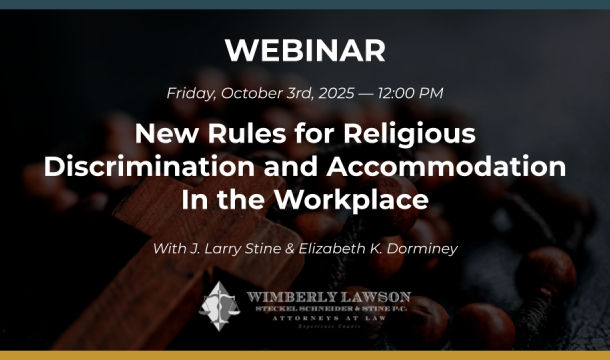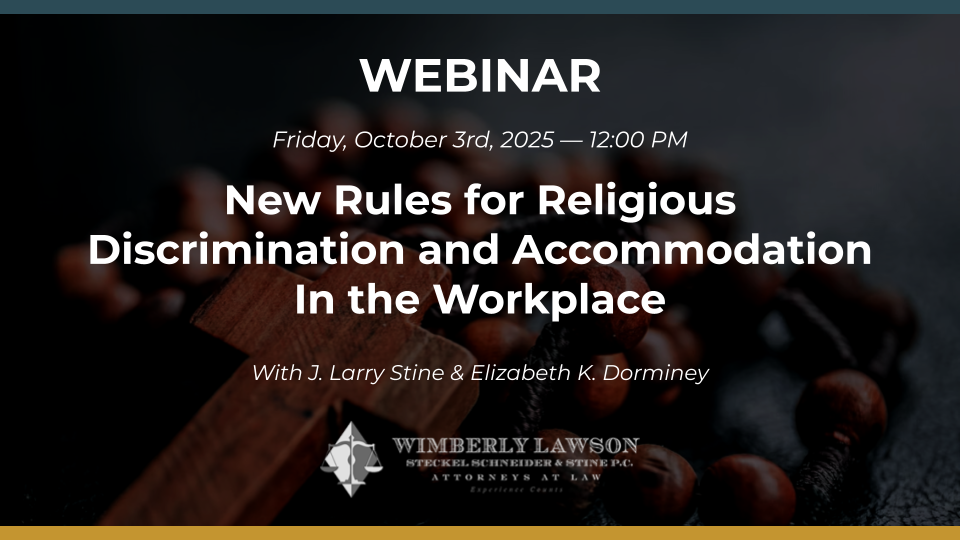Me Too? Is This A Good Time for a Company To Conduct Workplace Harassment Training?
Unless you are living under a rock or in a digitally untethered cabin in the woods, you are aware of the publicity concerning sexually inappropriate (and worse) behavior by Harvey Weinstein and Amazon Studios' Roy Price. These revelations have been followed by the hashtags and social media posts of "me too" which scores of women have used to share their experience of sexual harassment and sexual assault.
In the face of this firestorm, what is a company to do? There are two main options: (1) embrace the moment and demonstrate commitment to a policy that the company will not tolerate sexual harassment in the workplace, or (2) ignore it and hope this whole issue blows over. While option #2 may be cheaper in the short term, it is highly unlikely that the issue of sexual harassment in the workplace is going to just "go away" any time soon. From a legal and practical standpoint, companies should be looking at option #1. The EEOC thinks so, too. According to Acting EEOC Chair Victoria Lipnic, "This is an opportunity in terms of what you do in house for compliance and really do the things that need to be done to address this topic."
What kinds of things can and should a company do now to address the issue of harassment in the workplace?
Actually, the question should be: what is your company already doing to prevent and address harassment in the workplace? Because if your company has more than 15 employees, your company has an affirmative duty to prevent and address harassment, thanks to two Supreme Court cases decided in 1998. In Burlington Industries, Inc. v. Ellerth, 524 U.S. 742, 118 S. Ct. 2257 (1998), and Faragher v. City of Boca Raton, 524 U.S. 775, 118 S. Ct. 2275 (1998), the U.S. Supreme Court imposed an unprecedented affirmative burden on all employers to prevent and address the issue of sexual harassment in the workplace. From that point forward, it became more important than ever for all employers to review their policies and procedures regarding harassment in the workplace.
In the Faragher and Ellerth cases, the Court established a framework for determining an employer's liability for harassment by its supervisory employees:
- First, the Court criticized the division of sexual harassment into the categories of "quid pro quo" and "hostile environment."
- The law now focuses on whether supervisory harassment results in a tangible employment action against allegedly harassed employees. A tangible employment action involves a significant change in employment status, such as hiring, firing, failing to promote, or reassigning to a position with significantly different responsibilities.
- If there is a tangible employment action, the employer will be held strictly liable for the conduct of the harassing supervisor.
- If the harassment by the supervisor does not result in a tangible employment action, though the employer may not be strictly liable for the supervisor's conduct, the employer may be liable if the harassing conduct is severe and pervasive (this is what was typically referred to as a hostile environment case). In situations such as these, the employer may avoid liability through the affirmative defense.
This defense requires the employer to prove that:
- it took reasonable preventive and remedial steps against harassment, and
- the complaining employee did not utilize these measures to avoid the harm underlying the complaint.
This rule currently only applies to supervisory harassment. If the alleged harassment is committed by a co-worker, or other non-supervisory employee, then the Faragher/Ellerth framework does not apply. In cases involving harassment by a non-supervisor, an employer may be liable for harassment if it knew or should have known about the harassment and failed to take prompt, effective remedial action.
The following is a list of basic strategies to meet the affirmative burden and avoid liability. [If you are interested in a more detailed discussion of these strategies or how to handle issues of sexual harassment in the workplace, Wimberly Lawson has a publication available entitled "Strategies for Successfully Handling Sexual Harassment Complaints." Please email me at kjj@wimlaw.com if you would like to purchase a copy.]
1. A Written Policy Prohibiting Harassment.
2. Dissemination of The Policy.
3. A User-friendly Reporting Procedure.
4. Promptly investigate.
5. Take prompt and effective remedial action (and follow up) when necessary.
6. Recordkeeping.
7. Training. Supervisor and employee training continue to be of vital importance to employers seeking to avoid sexual harassment liability under Title VII.
Do not succumb to the mistaken belief that training and discussion of sexual harassment will only serve to stir up complaints. Employees are already inundated with news stories of sexual harassment on an almost daily basis. Additionally, savvy plaintiffs' lawyers are using the media to stir up claims and generate business of their own. If your company does not make sufficient efforts to address the issue of sexual harassment in the workplace, your company will be an easy target for these lawyers.
Things a company can do right now:
- Remind all employees that the company does not tolerate harassment in the workplace and that it has a procedure for them to use if they have any complaints about harassment in the workplace.
- Talk to supervisors and managers about the issue of harassment in the workplace. Make sure they know what to do if they become aware of a complaint of harassment. Also make sure that they understand the company's policy against harassment and complaint procedure so that they can answer any employee questions (or know where to send employees if they can't answer a question.)
- If you already have harassment prevention training scheduled at regular intervals, remind employees of that training and the dates it will be given.
- If the company has not conducted any harassment training in over one year, it is a good time to think about scheduling some training in the near future.
- If you have any questions about how to go about implementing any of these strategies, talk to qualified employment counsel.

Kathleen J. Jennings is a former principal in the Atlanta office of Wimberly, Lawson, Steckel, Schneider, & Stine, P.C. She defends employers in employment matters, such as sexual harassment, discrimination, Wage and Hour, OSHA, restrictive covenants, and other employment litigation and provides training and counseling to employers in employment matters.
Related Content
Get Email Updates
Recent Content

Trump Nominates Appointments to NLRB and EEOC but Policy Changes Likely to Be Delayed

DOL Launches Self-Audit Programs Designed to Help Employers Improve Compliance

DOL Must Release EEO-1 Reports to the Public under Open Records Laws

Current Advice on Active-Shooter Situations

New Policy for Federal Workers and Religious Expressions

